Key takeaways:
- Cryptocurrencies are treated as property by the IRS, with each transaction potentially affecting tax obligations.
- Utilizing dedicated tax software can streamline the tracking of crypto transactions and simplify reporting, reducing stress during tax season.
- Understanding the differences between realized and unrealized gains is essential for accurate tax calculations and reporting.
- Staying informed about changing tax regulations through credible sources and community engagement is vital for effective crypto tax management.
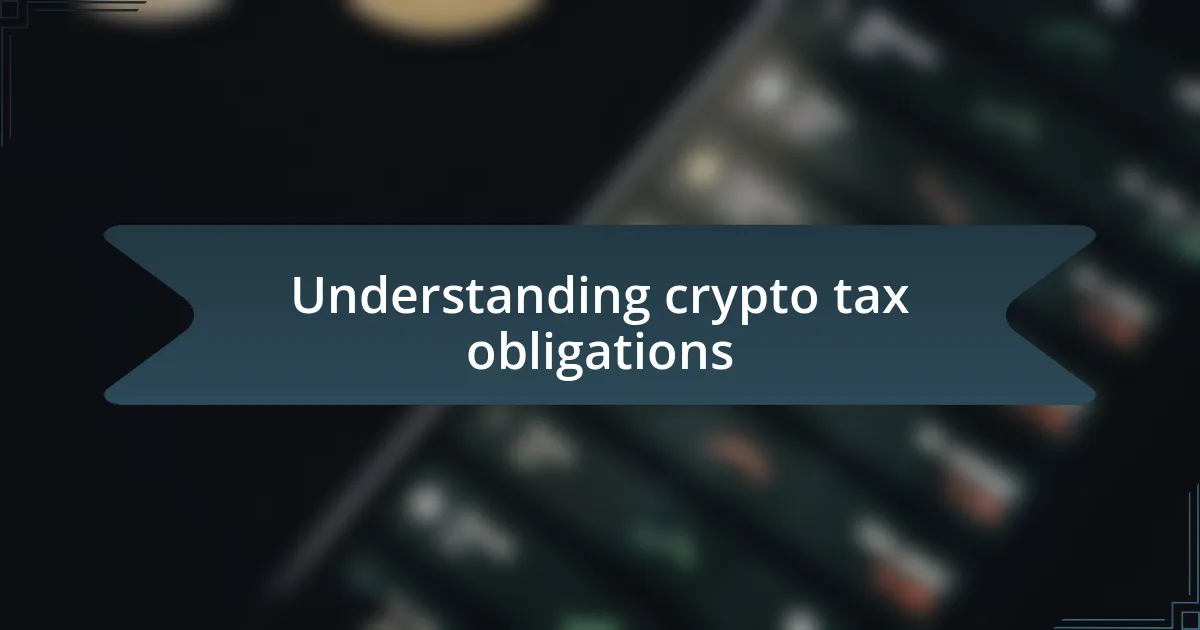
Understanding crypto tax obligations
Navigating crypto tax obligations can feel overwhelming, especially with the rapid evolution of regulations. I remember staring at my tax documents one year and thinking, “What on earth am I supposed to report here?” It was a learning curve that taught me the importance of understanding how different transactions are categorized.
I’ve come to realize that every trades, sales, or even simple transfers can impact your tax situation. This realization hit home when I discovered that a seemingly innocuous transaction could lead to unexpected capital gains. Have you ever wondered how much those small trades can accumulate over time? I certainly didn’t, but getting a grip on these nuances made all the difference in my approach to crypto.
It’s crucial to understand that the IRS treats cryptocurrencies as property, meaning each transaction is potentially taxable. This perspective shifted my mindset from viewing taxes as a burden to seeing them as a necessary part of my investment journey. With this knowledge, I felt empowered to track my transactions more diligently and approach my tax obligations with greater confidence.
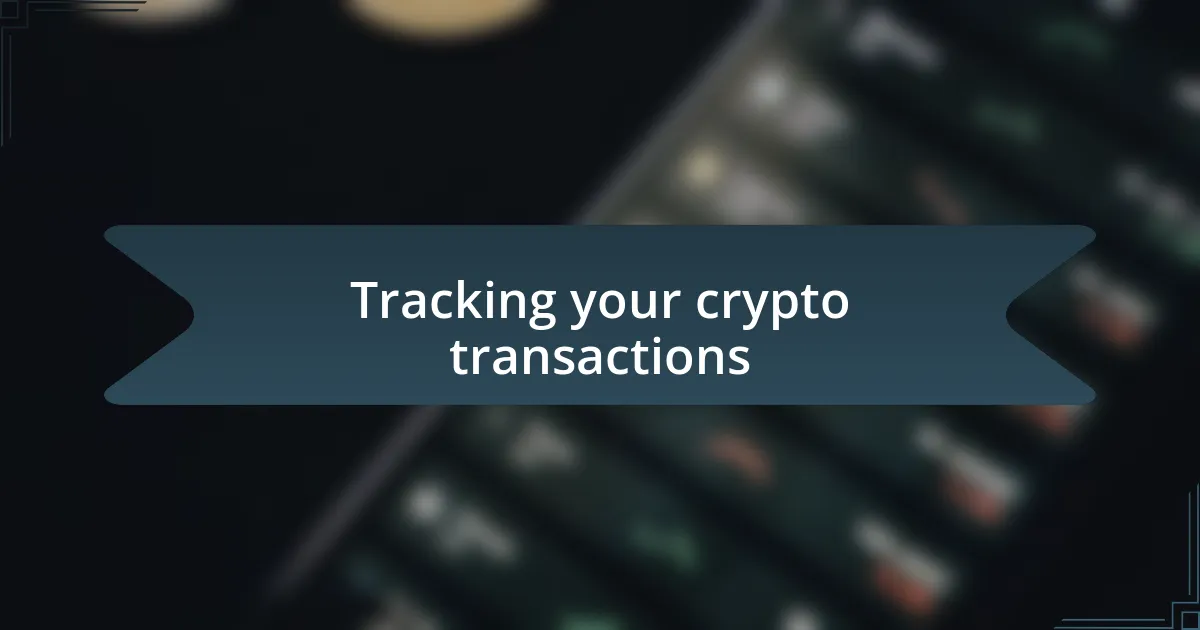
Tracking your crypto transactions
Tracking crypto transactions is a task that can quickly spiral into chaos if not approached systematically. I personally invested in a reliable tracking software after losing hours sifting through wallets and exchanges trying to piece together my trading history. Can you imagine the frustration of searching for a single transaction from months ago? A solid platform can make this cumbersome task feel like a breeze, allowing you to focus more on your investment strategies rather than record-keeping.
As I navigated various tools, I learned that some platforms allow automatic syncing with exchanges and wallets, which saves a tremendous amount of time. I remember one particular instance when a software update caught a transaction I hadn’t even remembered making—it turned out to be more significant than I realized. Utilizing such tools not only simplified my tracking process but also offered insights into my investment patterns.
Ultimately, the way you choose to track your transactions can significantly influence your tax reporting accuracy. I know I’ve missed out on tax advantages simply because I didn’t have the full picture of my trades. So, whether you’re using spreadsheets or specialized software, the key is consistency and regular updates to maintain a clear overview of your crypto activities.
| Tracking Method | Pros |
|---|---|
| Manual tracking (spreadsheets) | Flexible, customizable, low cost |
| Dedicated crypto tax software | Automated syncing, real-time updates, tax reporting features |
| Brokerage platform tools | Integrated, easy to use, less effort needed |
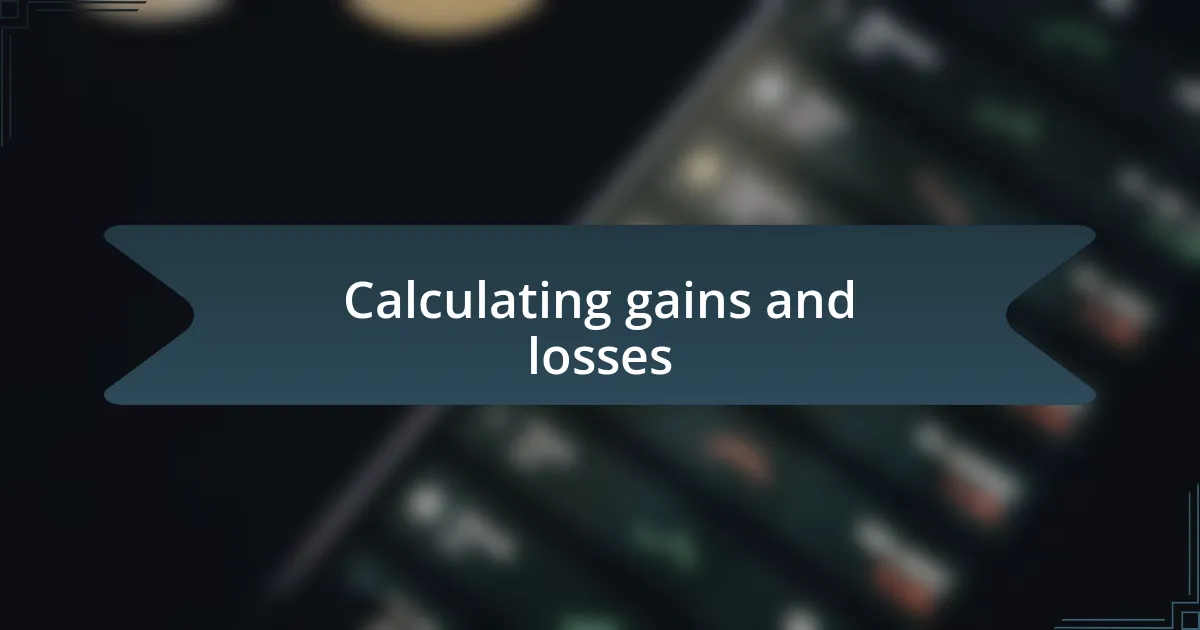
Calculating gains and losses
Calculating gains and losses can feel daunting, especially when your investments zigzag between highs and lows. I remember staring at my spreadsheets, grappling with the realized and unrealized gains while trying to figure out how to interpret the numbers. It’s essential to distinguish between what you’ve sold (realized gains) and what you still hold (unrealized gains) since only realized gains impact your tax liability. This clarity helped me immensely during tax season, alleviating a lot of stress.
Here are a few key steps I found useful in calculating my crypto gains and losses:
- Track purchase price: Keep a record of the amount you paid for each cryptocurrency, including transaction fees.
- Document sales: Record how much you sold your crypto for, again factoring in any selling fees.
- Calculate gains/losses: Subtract the purchase price from the selling price; a positive number indicates a gain, while a negative number indicates a loss.
- Consider holding periods: Recognize the difference between short-term and long-term gains, as they are often taxed at different rates.
- Utilize tools: Invest in a tax calculator designed for cryptocurrencies, which can streamline this process and avoid errors.
Using this approach has transformed how I view my crypto portfolio. Instead of a source of anxiety, I now see it as an organized collection of efforts that makes sense both financially and emotionally.
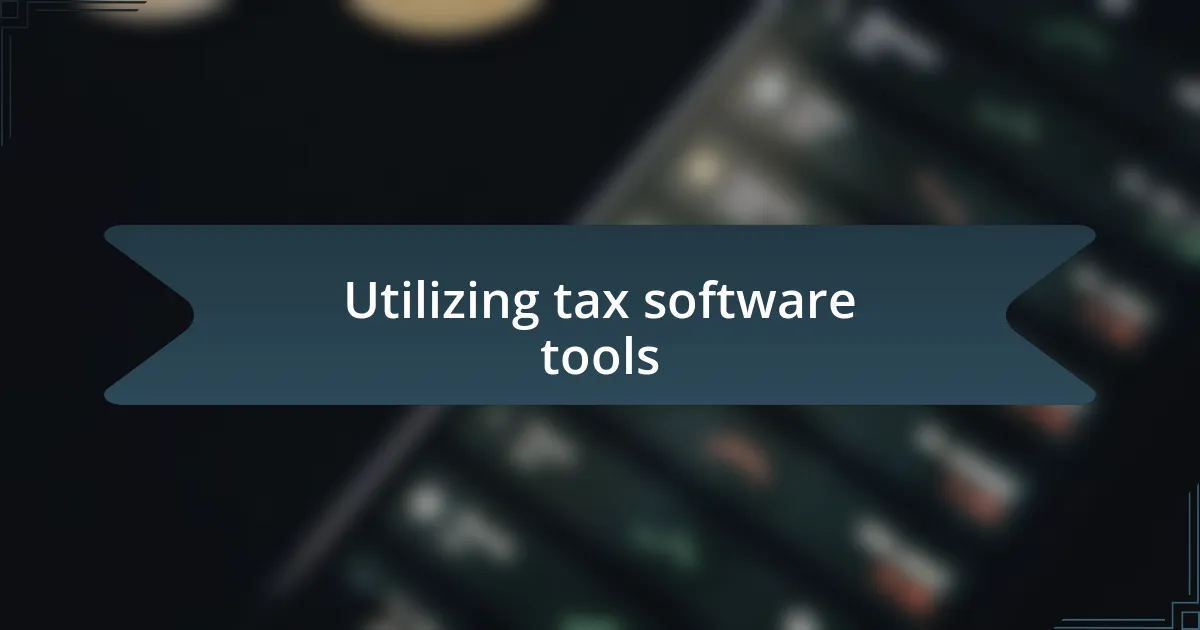
Utilizing tax software tools
Engaging with tax software tools has been a game changer in my journey through the complexities of crypto taxes. I once grappled with manual calculations, anxiety bubbling up as I double-checked every figure. But investing in software specifically designed for crypto made the process feel less like a chore and more like a streamlined experience. Have you ever felt that weight lift when things suddenly become easier? I know exactly how that feels.
I started by exploring various tax software options that catered to my needs, and honestly, I was surprised at how user-friendly they were. With features that automatically import transaction details, I could finally breathe a sigh of relief. I distinctly remember one late night where I watched the software compute my gains and losses in real-time; that instant feedback was not only satisfying but also empowering. It transformed the dreary task of tax season into something manageable and, dare I say, enjoyable.
Another aspect of the tax tools that astounded me was their capacity to generate comprehensive reports. I reflected on my previous experiences where compiling data felt like climbing a mountain, only to realize how easy it could be with the right tool. Seeing all my relevant information compiled in one concise report not only saved time but also alleviated my fears of missing critical details. Do you ever wonder how much simpler tasks could be with the right resources? Trust me; using these software tools makes a world of difference.
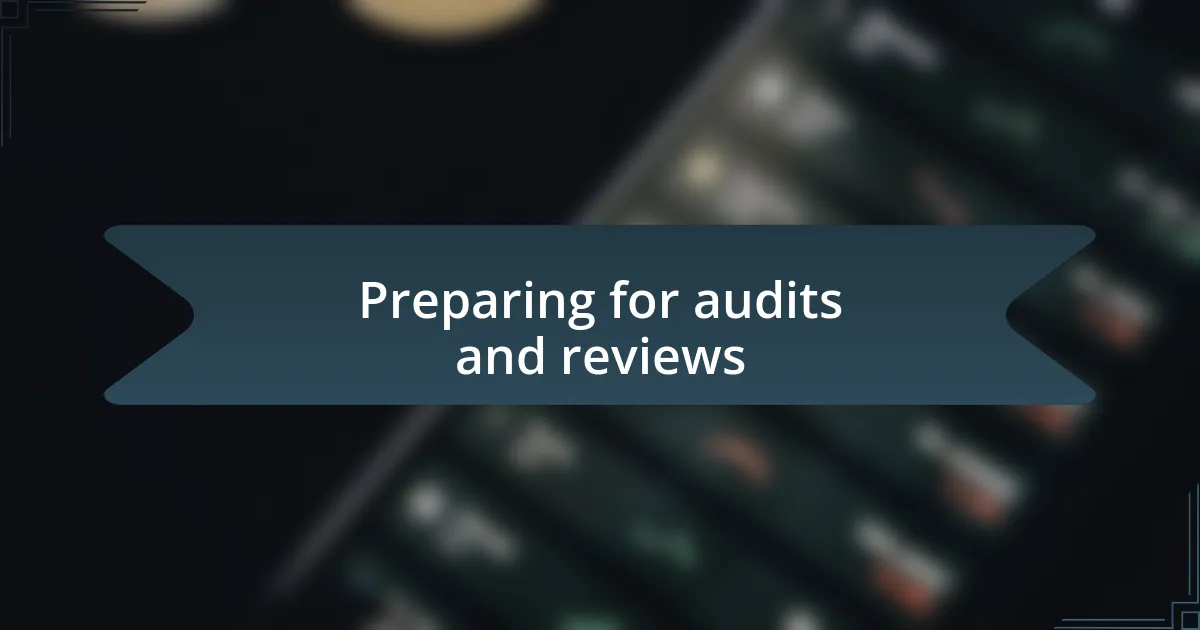
Preparing for audits and reviews
Understanding the landscape of audits can be daunting. I remember the first time I received a notice from the IRS; my heart raced as I thought of all the paperwork I needed to pull together. So, when preparing for potential audits, my mantra became organization. By keeping a meticulous record of all my transactions and correspondence with tax authorities, I found that I could approach audits with a sense of confidence rather than dread. Have you ever felt that secure knowing everything is in its place?
As I prepared for reviews, I discovered the importance of clarifying my documentation. For instance, I started tagging my crypto transactions with detailed notes about the purpose, such as whether they were investments or expenses. This extra layer of context not only made it easier for me during tax season but also ensured I had clear explanations ready if questions arose. It’s almost like having a roadmap; wouldn’t it be reassuring to navigate the complexities of audits with such clarity?
Regular self-audits became another essential practice for me. I set aside time each month to review my records and ensure everything aligned with my tax filings. There were instances when discrepancies cropped up, and catching them early saved me from potential headaches down the line. Have you considered how often we overlook little details that could snowball into bigger issues? This habit not only prepared me for formal audits but also provided peace of mind knowing that I was always a step ahead.

Seeking professional tax advice
Seeking professional advice about crypto taxes was a turning point for me. Initially, I thought I could handle everything on my own, but I quickly realized that the complexities of tax regulations surrounding cryptocurrencies were beyond my grasp. It felt like trying to solve a puzzle with missing pieces, and the thought of making a mistake was unsettling. So, I reached out to a tax professional who specialized in cryptocurrencies—and what a relief that was! Getting expert guidance not only clarified my tax obligations but also eased the anxiety that had been building up inside me.
During that consultation, I learned about reporting requirements that I hadn’t even considered. For example, the distinction between long-term and short-term capital gains was an eye-opener. I had always thought of my gains as straightforward, but it turns out that the timing of my transactions significantly affected my tax bill. Can you imagine the stress I avoided by understanding these nuances early on? Having a knowledgeable advisor by my side felt like having a compass guiding me through a foggy landscape.
Now, I can’t emphasize enough the importance of finding a professional who stays updated on the ever-changing tax laws related to cryptocurrency. In my experience, the tax landscape shifts rapidly, and having someone who understands the latest developments is invaluable. It’s like having a trusted partner in your financial journey. Have you thought about how a tax professional could turn what feels like a chaotic maze into a clear path? For me, that partnership transformed my approach to crypto taxes from fear to confidence.
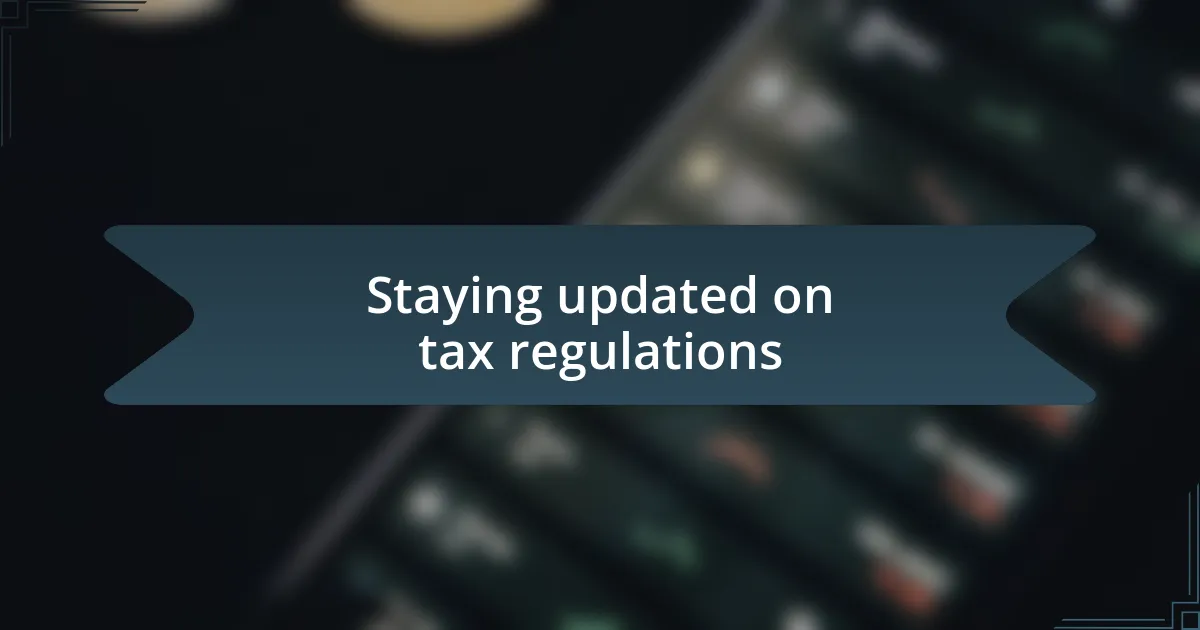
Staying updated on tax regulations
Staying updated on tax regulations is crucial in the constantly evolving world of cryptocurrency. I’ve found that relying solely on annual tax filings can lead to surprises, especially when new rules emerge mid-year. I remember a time when I missed a regulation change about token airdrops, which unexpectedly affected my tax bill. That experience motivated me to make staying informed a regular part of my routine.
One effective strategy I’ve adopted is subscribing to newsletters from reputable tax advisory firms that focus on cryptocurrencies. These updates often highlight key changes and offer insights on how they might impact personal tax situations. I make it a point to set aside time each month to read these resources, and I can’t tell you how empowering it feels to proactively manage my knowledge. Have you ever felt the weight lift off your shoulders after grasping a concept that had previously felt overwhelming? Staying informed transforms potential stress into clarity.
Additionally, I’ve joined online communities where members share their experiences and insights related to crypto taxes. Interacting with others in similar situations not only strengthens my understanding but also provides emotional support. It’s reassuring to know that I’m not alone in navigating these complex rules. Have you considered how community support could enrich your perspective on tax regulations? For me, these conversations have been invaluable, offering practical tips and fostering a sense of shared exploration.











